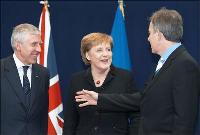EU leaders meet in Portugal discussing how to break bloc's stalemate over planned constitution
European Union leaders meet in Portugal for what they say is a "brainstorming session" on how to break the bloc's stalemate over a planned constitution.

Since voters in France and the Netherlands snubbed the idea in ballots two years ago, the EU has been divided over what to do.
European Commission president Jose Manuel Barroso and German Chancellor Angela Merkel are among the restricted group meeting in Sintra, near Lisbon, barely a week after France elected a new president a development they hope will restore momentum to the EU's plans.
"We're going to take the measure of the current European situation, in a completely informal way, and see what our next steps should be," Barroso said earlier this week.
The constitution would give the 27-nation bloc a bill of rights, a president and foreign minister, as well as more majority voting that would speed decision-making. It would, its proponents say, allow the bloc to focus its strengths and free it to take a more influential place in world affairs.
The plan was for the constitution to come into effect last November. Instead, it has become a contentious issue that has set EU nations against each other.
Barroso said last month the constitutional spat has "put in question (the EU's) credibility." Failure to reach agreement "will continue to weaken us internally and externally," he said.
Portuguese prime minister Jose Socrates and his Slovenian counterpart Janez Jansa, as well as the president of the European Parliament, Hans-Gert Poettering, are also attending the talks.
Merkel, whose country holds the six-month rotating EU presidency, wants the bloc's leaders to adopt a "road map" toward ratification of a revised constitution at a June summit.
That would leave the Portuguese, who take over the presidency July 1, or maybe Slovenia, which follows Jan. 1, to organize a special summit to endorse a constitution ahead of European Parliament elections in 2009.
The constitution needs unanimous backing from all member states for it to take effect.
So far, 18 nations have ratified the current version.
Germany, Belgium, Italy, Spain and the Nordic countries want to preserve as much as possible from the constitution as it was drafted.
However, Britain, France, the Netherlands, Poland and the Czech Republic want to ditch some parts. Particularly unpalatable are the charter's name, which for many smacks of a European super state, and more decisions by majority vote instead of unanimity, which would weaken their negotiating power.
Italian prime minister Romano Prodi recently suggested another option: allowing what he called "a core group" of countries favoring the constitution to go ahead and adopt it, leaving behind those who had misgivings.
Prodi, a former European Commission president, expressed impatience with the delays, depicting the EU as a prosperous but complacent group that has taken its eye off the ball.
"We can continue to sleep, to take it easy, or we can shoulder our responsibilities," he said during a recent trip to Lisbon.
Subscribe to Pravda.Ru Telegram channel, Facebook, RSS!


